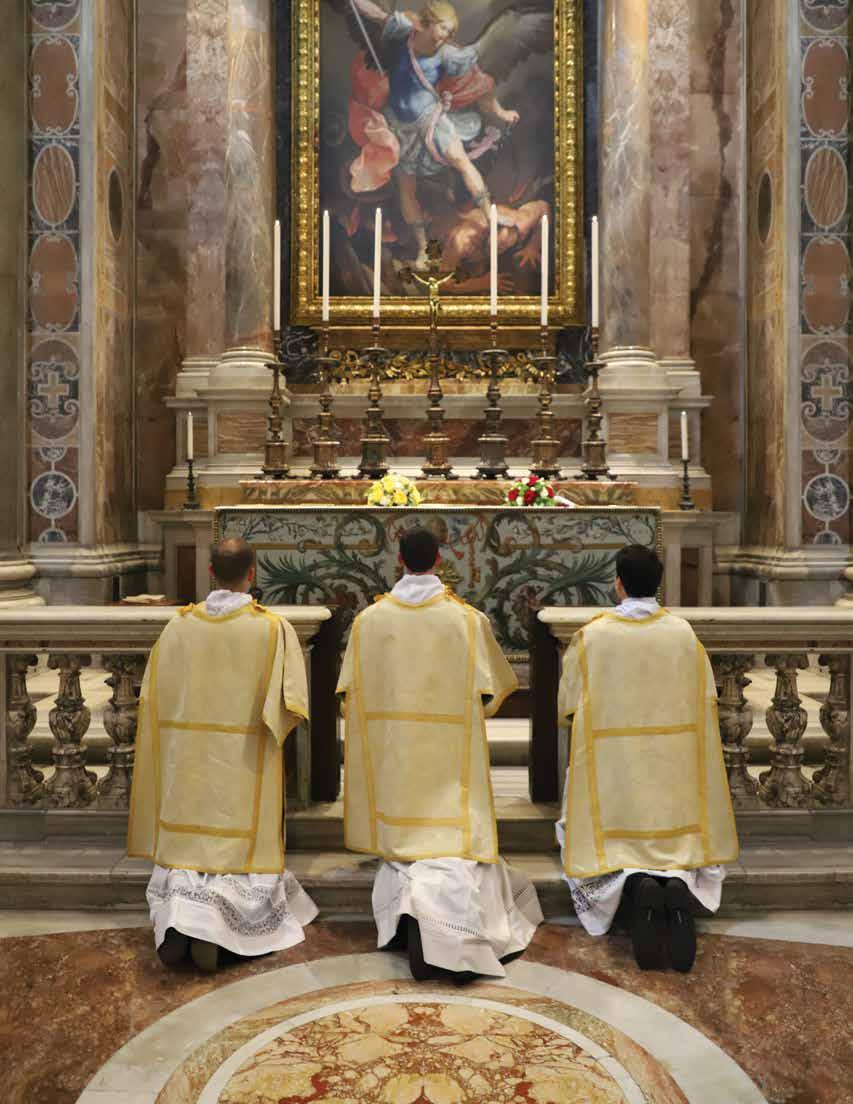
roman echoes THE PONTIFICAL NORTH AMERICAN COLLEGE VOLUME 27 ISSUE 1 2022 Surrender Page 10 New Faculty Members Page 20 Diaconate Ordination Page 30 Rector Installation Page 34 Advent Reflections
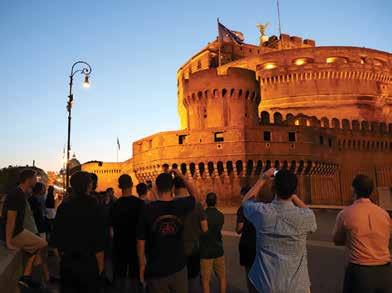
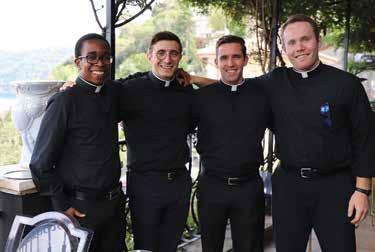
2 The Pontifical North American College Contents 15 6 Priesthood Ordination 8 Year II Summer Assignments 10 New Faculty 12 New Man Arrival 15 Welcoming Our New Brothers 16 Small Acts, Great Love 17 Jonathan Roumie at the NAC 18 Preparing to Preach 20 Diaconate Ordination 22 First Homilies 24 Our New Music Director 26 Opening Mass Homily 28 A Toast to the Year Ahead 30 Rector Installation 32 Vocation Story 34 Advent Reflections 12 Features Updates 5 Rector’s Corner 14 Voices of NAC 36 Casa 37 ICTE 38 Office of Institutional Advancement THE PONTIFICAL NORTH AMERICAN COLLEGE facebook.com/PontificalNorthAmericanCollege instagram.com/pnac_rome
From the Editor
My favorite tradition at the NAC happens in late September. As the fifth-year priests return to Rome, we announce their arrival at pranzo. The one making announcements says: “We welcome back to the College, Father _______!”
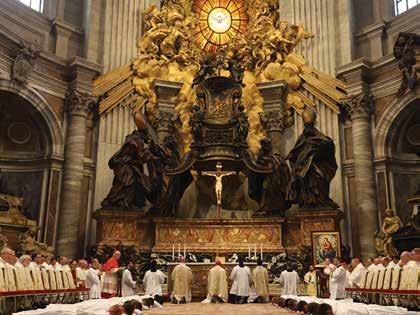
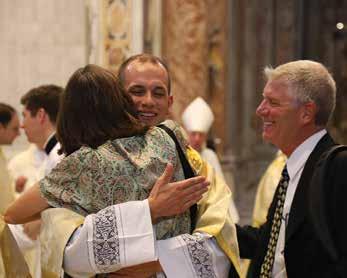
The refectory erupts in cheers.
Why do we applaud? Why is this such a joyful occasion? We clap to welcome guests each week—sometimes twice! We also clap as a way to say “Happy Birthday!” to each seminarian who has a birthday in the coming week. Yet, in this moment, something unique happens.
We don’t cheer because we think he is a guest or because his birthday may be approaching. We don’t even cheer because he made it through seminary formation, though he has. We applaud because we see a man whose heart was captivated by Jesus Christ, who was invited to share in Jesus’s work of serving humanity, and who surrendered to Jesus with his own, individual “yes.” This moment evokes a joy so palpable that it fills our refectory. It is a beautiful testimony to the joy that flows in a community of brothers focused on Christ.
As we see in this issue, surrendering to Jesus does not only happen with grand events like an ordination, nor is a “yes” to Jesus usually followed by applause and public recognition. It happens mostly in small and often hidden ways. For us here at the College, it starts each morning in the chapel with Mass and continues at our universities and apostolates. Like the refectory erupting in cheers, surrendering to Jesus fills our hearts with joy—a gift from God for responding to his invitation.
Editor-in-Chief Matthew Ludwig '24, Archdiocese of Washington

20 32
3 ROMAN ECHOES 2022 • VOLUME 27: ISSUE 1
Contributors
EDITOR-IN-CHIEF
Matthew Ludwig '24, Archdiocese of Washington
ASSISTANT EDITOR Will Robbins '25, Diocese of Beaumont
PHOTO EDITOR Aaron Salvan '24, Archdiocese of New York
ASSISTANT PHOTO EDITOR Chukwuma Odigwe '25, Archdiocese of Washington
Administration
of The Pontifical North American College RECTOR Rev. Msgr. Thomas W. Powers '97
VICE RECTOR Rev. David A. Schunk ‘10
CARL J. PETER CHAIR OF HOMILETICS
ROMAN ECHOES FACULTY LIAISON Rev. Peter John Cameron, OP
SUPERIOR, CASA SANTA MARIA Rev. James J. Conn, SJ
DIRECTOR, INSTITUTE FOR CONTINUING THEOLOGICAL EDUCATION Rev. Edward Linton, OSB
EXECUTIVE DIRECTOR, INSTITUTIONAL ADVANCEMENT Mark Randall, CFRE
For more information about The Pontifical North American College, subscription questions, or to learn about ways you can financially support “America’s Seminary in Rome,” please contact Mark Randall, CFRE, Executive Director, Institutional Advancement.
Tel: (202) 541-5411 Fax: (202) 470-6211 Email: pnacdc@pnac.org Website: www.pnac.org
This publication is written, edited, and photographed by the students of The Pontifical North American College.
COVER: After being ordained deacons in St. Peter's Basilica, Rev. Mr. Ben Pribbenow '23 (Green Bay), Rev. Mr. Daniel Scanlan '23 (Venice in Florida), and Rev. Mr. John Lado '23 (Washington) kneel in prayer at the altar of St. Michael the Archangel, on whose feast day they were ordained.
THIS PAGE: This statue of St. Ambrose adorns the Altar of the Chair in St. Peter’s Basilica. St. Ambrose provides a great example to all of total surrender to the Lord and his will for our lives.
BACK COVER: St. Peter's Basilica at sunset.
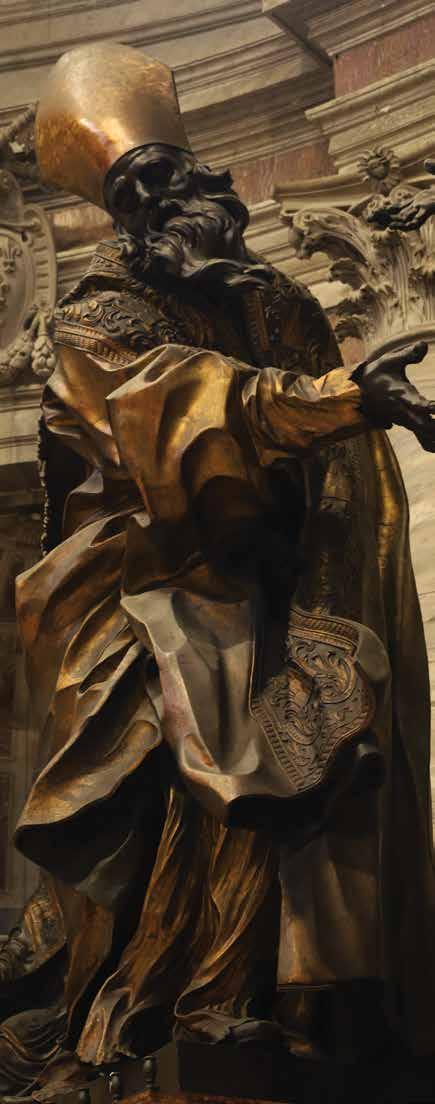 4 The Pontifical North American College
4 The Pontifical North American College
RECTOR’S CORNER
Dear Friend of The Pontifical North American College,

It would be hard to find a better view of the city of Rome than from the roof of the College. Standing on the sixth floor from atop the Janiculum Hill, one can admire the dome of St. Peter’s Basilica and point out landmarks that have adorned this city for hundreds, and in some cases, thousands of years. A wonderful view, indeed.
It is an honor for me to be serving as the Rector of the Pontifical North American College. My primary goal is to be a spiritual father to the seminarians and a fraternal support to the community of formators. Please pray that I may do that worthily and well.
There is, however, another view from inside the College that is the best of all. It is the one from inside the Immaculate Conception Chapel where all of the seminarians and the formation team gather together every day for community Mass and to pray Morning Prayer and Evening Prayer. For as truly awesome as the view from the roof of the College is, to see over one hundred seminarians turn their minds, wills, and voices toward God in worship and prayer is truly awe-inspiring. These men are here to be formed as priests with the heart of Jesus and to surrender their entire lives to him for the sake of his Church. A wonderful view, indeed!
In that sacred space, the men look to Christ in the tabernacle asking for the grace of perseverance and courage, and they look up at the majestic mosaic of the Blessed Virgin Mary, imploring her intercession and protection. They pray together as brothers, preparing themselves to say “yes” to God’s holy will in obedience and in a sincere gift of self. It is fitting that every four weeks they all pray these words from the Breviary, our common liturgical book of prayer: “Surrender to God, and he will do everything for you.”
It is an honor for me to be serving as the Rector of the Pontifical North American College. My primary goal is to be a spiritual father to the seminarians and a fraternal support to the community of formators. Please pray that I may do that worthily and well.

If you find yourself in Rome, please come for a visit to the College. We will be happy to show you the view from the roof; however, if you want an even more memorable and inspiring view, you may want to start in the chapel.
Thank you for your continued support, for which we are deeply grateful.
Rev. Msgr. Thomas W. Powers ‘97 Rector
5 ROMAN ECHOES 2022 • VOLUME 27: ISSUE 1
To live in the midst of the world without wishing its pleasures; To be a member of each family, yet belonging to none;
To share all suffering; to penetrate all secrets;
To heal all wounds; to go from men to God and offer Him their prayers; To return from God to men to bring pardon and hope; To have a heart of fire for Charity, and a heart of bronze for Chastity To teach and to pardon, console and bless always.
My God, what a life; and it is yours, O priest of Jesus Christ.

6
The Pontifical North American College
Henri Lacordaire
In the minutes leading up to their ordination to the diaconate, Rev. Mr. Brent Durschmidt '23 (Portland in Oregon), Rev. Mr. Joseph Lapeyrouse '23 (Houma-Thibodaux), and Rev. Mr. Taylor Colwell '23 (Washington) pray in the sacristy chapel of St. Peter's Basilica.
“What A Life”
REV. JOSEPH FERME IV ’22, ARCHDIOCESE OF BOSTON

My God, what a life, and it is yours, O Priest of Jesus Christ!” Thus ends Lacordaire’s well-known poem detailing the blessings which belong to the life of a priest. It remains somewhat surreal as I reflect that this blessed life is now my own. I was ordained a priest on May 21st of this year for the Archdiocese of Boston by Seán Cardinal O’Malley. That joyous day came after six wonderful years of formation. The journey began when I surrendered to the growing desire in my own heart for the priesthood—a desire placed there by God.
A common response of family and friends when I told them about the six-year path to the priesthood was one of shock: “It takes six years?!” I was proud of the answer I finally came up with: “I need six years.” As ordination day drew near, I looked back and marveled at what God had done in my life. At the same time, I could also recognize that I remained imperfect. Precisely at this time, aided by helpful counsel from my spiritual director, I was able to surrender. By recognizing and accepting my imperfection, I was also able to see more clearly how the priesthood is pure gift. The vocation was never about me becoming worthy of the call, but about allowing God to accomplish His work in and through me. Seeing my own shortcomings in clearer relief allowed me to be more thankful for the gift. Indeed, I am a priest – but always a priest of Jesus Christ.
On that Saturday in May, I surrendered myself to the Archbishop of Boston, promising obedience to him and his successors. In lying on the marble floor, I surrendered my whole life to the service of God’s holy people. This past summer, I experienced that service during my time as parochial vicar at three parishes in the Archdiocese. During my short stay, I celebrated many Masses and funerals, sat for hours in the confessional, baptized, anointed, blessed, and visited. Indeed, what a life it is! In the words of Lacordaire, I went “from men to God to offer Him their prayers” and returned “from God to men to bring them His pardon and hope.”
I also learned to surrender expectations (not to mention a daily schedule!). There was no planning where and for whom God would use me. The summer was filled with many beautiful encounters and moments of grace, and each day could have ended with an exclamation of gratitude: “My God, what a life!” One such encounter came in the midst of an already busy day—an unexpected call to anoint someone. It was only my second anointing. So, between celebrating a funeral and a Saturday evening Mass, I went to the bedside of a woman who was conscious, but likely not fully aware of her surroundings, and was surrounded by her family. As I stood among them, she asked if she could hold my hand. She did not know me, but she knew a priest was at her side. I anointed her and fed her with the Bread of Life, which became food for the journey as she passed the following day. I was privileged to be able to celebrate her funeral. These, and other such encounters, support Lacordaire’s claim.
Yes, what a life it is. There is no telling what it will look like in the years to come, but I have no reason to doubt the words of the poem: the life of the priest is “to bless and be blest forever.” Though I have much to learn and many ways to grow, it is all God’s work to bring to fulfillment—I have only to cooperate with him. In the meantime, I am grateful for this life, the life of a priest of Jesus Christ. n
7 ROMAN ECHOES 2022 • VOLUME 27: ISSUE 1
During the Mass of his priestly ordination, Rev. Joseph Ferme IV, '22 (Boston) places his hands in those of His Eminence Seán Cardinal O'Malley OFM (Boston) and makes his promise of obedience.
Year II Summer Assignments
“Declare his glory among the nations, his marvelous works among all the peoples!” (Ps 96:3). A rising second-year seminarian typically spends his first summer overseas to serve at a parish, a sanctuary, or a religious order’s ministry. He may also pursue further study through language schools or academic seminars. Second year seminarians were blessed to encounter and to serve the universal church through the following apostolic experiences. Here is an overview of where students served this past summer.
Academic/Language Study
Institut Catholique de Paris (Paris, France)
Language International (Liguria, Italy)
Siena Lingue Dante Alighieri School (Siena, Italy)
Tertio Millennio Seminar (Krakow, Poland)
The Italian School (Verbania, Italy)
Universidad Católica de Ávila (Ávila, Spain)
Service/Missionary
Don Bosco Salesian Summer Camp (Pordenone, Italy)
Missionaries of Charity (Madrid, Spain)
Notre Dame of Jerusalem Center (Jerusalem, Israel)
Sanctuaires Notre-Dame de Lourdes (Lourdes, France)
Ukrainian Refugee Centers (Krakow, Poland)
Parish Assignments Overseas
Chiesa Collegiata dei Ss. Francesco e Ilaro (Lugo, Italy)
Chiesa di Campocroce (Mogliano Veneto, Italy)
Our Lady Help of Christians (Bedfordshire, United Kingdom)
Parrochia San Gavino Martire (Sardinia, Italy)
Parroquia Jesús y María (Aluche, Spain)
Parroquia Santo Cristo de la Misericordia (Madrid, Spain)
St. Catherine of Siena Parish (Melbourne, Australia)
Sts. Peter and Paul's Parish (Cork, Ireland)
Parish Assignments in the US
All Saints Parish (Eagle Butte, SD)
Church of St. Benedict (Broken Arrow, OK)
Pilgrimages
Camino de Santiago (Spain)
8 The
Pontifical North American College
Melbourne, Australia
Eagle Butte, SD Broken Arrow, OK
A Small, Humble Parish in the barrio
NICHOLAS MONNIN ‘25, DIOCESE OF FORT WAYNE-SOUTH BEND
My goals for the summer were two-fold: 1) improve my fluency in Spanish and 2) gain meaningful pastoral experiences. God granted these in the end, but not in the way I planned.
I had the opportunity to spend five weeks at a small, humble parish in the barrio of Aluche in Madrid, Spain. Most of my time was spent outside of the city, where I worked at various diocesan youth camps. When I first arrived, I had many expectations for how my summer would go and what kinds of experiences I would have, but I was quickly met with the reality of my own inability to achieve my expectations or control my experiences. I felt disappointed and wanting.
God was inviting me to a deeper relationship and ministry through these challenges. He was calling me to surrender my inabilities and my expectations for myself and for the summer so that he could do something beautiful.
By the time I left the parish, I had achieved my goals for the summer. I improved my ability and confidence in Spanish, and I also gained great pastoral experiences while forming meaningful relationships. Ultimately, it was only because I surrendered my plans and desires to God and his Providence, allowing him to work through me—despite my inabilities—that I was able to achieve my goals. And for that, thanks be to God! n
The Stones Will Cry Out
JOSEPH DOHERTY ‘25, DIOCESE OF VENICE IN FLORIDA
With arms raised, Nicholas Monnin '25 (Fort Wayne-South Bend) cheers his hiking group on as they march across the Spanish countryside.

"If I forget you, Jerusalem..." (Ps 137:5)
Jacob Tschida '25 (Duluth), Joseph Doherty '25 (Venice in Florida), and Michael Rhodes '25 (Austin) smile to record their time of service at the Holy Land's Notre Dame Center.

This past summer, two classmates and I had the opportunity to live and work in the Holy Land. One of the gifts of this experience was to participate in the Holy Mass offered next to the place of Jesus Christ’s burial. Each day, the Mass in the tomb is celebrated just inches above an ancient and sacred stone. This is the stone on which Jesus Christ’s body lay following his crucifixion and death—after the Lamb of God was sacrificed, his holy body rested there.
To witness the sacrifice of the Mass in this sacred space today invites a connection to be made. This stone slab on which Jesus’ body lay two thousand years ago can be considered a first altar, so it bears a connection to every local altar in every Catholic Church throughout the world. Daily at these stone altars throughout the world, the events of the Paschal Mystery become present and the body and blood of the sacrificial lamb, Jesus Christ, rest there. Christ’s bond of love unites the local parish altar and Jerusalem. It is a beautiful testament to the universality and unity of the Catholic Church. n
9 ROMAN ECHOES 2022 • VOLUME 27: ISSUE 1
New Faculty
WILL ROBBINS ’25, DIOCESE OF BEAUMONT
Rev. Msgr. Thomas Powers ‘97 joins the North American College as the 24th Rector. A priest of the Diocese of Bridgeport, Msgr. Powers was raised in Newtown, Connecticut. He holds a B.A. in Economics from the University of Notre Dame and worked as a financial consultant in New York City prior to entering the seminary. After philosophy studies at Saint John Fisher Seminary in Trumbull, Msgr. Powers attended the Pontifical North American College and earned a Bachelor of Sacred Theology from the Pontifical Gregorian University. He then obtained a Licentiate from the John Paul II Institute for Studies on Marriage and Family. He was ordained a priest for the Diocese of Bridgeport in 1997 and has served in many capacities. Most notably, Msgr. Powers was an Official in the Congregation of Bishops for ten years while also serving as an adjunct spiritual director at the North American College. Immediately prior to beginning as Rector, Msgr. Powers was the Vicar General of the Diocese of Bridgeport and the Pastor of Saint John Parish in Darien, Connecticut.

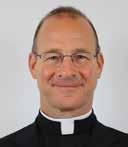
Rev. Anthony Ligato hails from the Diocese of Albany and comes to the North American College as the Assistant Vice Rector, Coordinator of Pastoral Formation, and a Formation Advisor. Fr. Ligato was raised in Troy, New York, and received a B.S. in Marketing and Management from Siena College in Loudonville, New York. He then attended St. Mary’s Seminary and University in Baltimore, Maryland, where he obtained both a Master of Divinity and a Bachelor of Sacred Theology. Fr. Ligato was ordained a priest for the Diocese of Albany in 1995 and has served in many parishes and capacities in his 27 years of priesthood. Prior to coming to the North American College, Fr. Ligato served as Vicar of Vocations for the Diocese of Albany, Rector of the St. Isaac Jogues House of Formation and Pre-Seminary, and Rector of the Cathedral of the Immaculate Conception in Albany, New York.
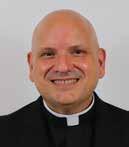
10 The
Pontifical North American College
Rev. David Foster, OSB is a Benedictine monk of Downside Abbey and joins the North American College as the Coordinator of Studies. He was born and raised in Birmingham, England, and received his degree from Corpus Christi College at Oxford. Fr. Foster entered the novitiate at Downside Abbey in 1980 and was ordained a priest in 1987. He has served in many capacities at the Abbey, such as Novice Master, Claustral Prior, and teacher in their high school. In 2012, Fr. Foster moved to Sant’ Anselmo, the International Benedictine College in Rome, where he continues to serve as a professor of philosophy, Latin, and Greek. In addition to his teaching duties, Fr. Foster is also the director of the schola cantorum and liturgical music at Sant’Anselmo. Fr. Foster is a published author with two works on prayer, Reading with God and Deep Calls to Deep

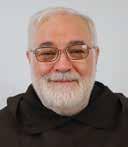
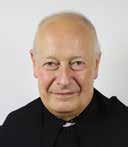
Rev. Eóin Moore, O.Carm. is a native of Dublin, Ireland, and a member of the Irish Province of the Order of Carmelites. He comes to the North American College as a Spiritual Director from his most recent appointment in Kinsale, County Cork, where he was Bursar and Director of the Spirituality & Retreat Centre. Fr. Moore completed his Philosophical and Divinity studies at the Milltown Institute of Philosophy and Theology in Dublin and his Liturgical Studies at the National Centre for Liturgy in Carlow. He holds professional and postgraduate qualifications in Education with a specialization in Advocacy and Special Needs Education. Fr. Moore has worked in parish, school, hospital, and spirituality center ministries, and he has held appointments as Sub-Prior, Vocations Director, Bursar, Chaplain, Spiritual Director, Teacher, and Curate. He attended the ICTE course in 2020 and spent the initial COVID-19 lock-down at the North American College.
Rev. Peter John Cameron, OP is a Dominican priest of the Province of St. Joseph and joins the faculty of the North American College as the Carl J. Peter Chair of Homiletics and as a formation advisor. Fr. Cameron grew up in Vernon, Connecticut. He was ordained a priest in 1986. Fr. Cameron has a Licentiate with a focus on the Passion narrative in the Gospel of Mark and a Master of Fine Arts in Playwriting from the Catholic University of America. He began teaching homiletics in 1994 in a myriad of seminaries, such as St. Joseph’s Seminary—Dunwoodie, New York; Immaculate Conception Seminary, Huntington, New York; the Dominican House of Studies, Washington, DC; and the Pontifical College Josephinum, Columbus, Ohio. Fr. Cameron was the Founding Editor-in-Chief of Magnificat, serving from 1998-2018. Additionally, he is the Editorial Director of Aleteia, the founder and artistic director of Blackfriars Repertory Theatre in New York City, and the author of ten books. Prior to joining the faculty at the North American College, Fr. Cameron was the Prior of St. Patrick Priory in Columbus, Ohio.
Mr. Stephen Smith comes to the North American College as the new Coordinator of Liturgical Music and Choir Director. He is a native of Tiffin, Ohio, and comes to Rome with his wife, Elizabeth, and tenmonth-old daughter, Briella. Mr. Smith earned his Bachelor’s degree from Heidelberg University, where he was both a featured organ soloist and accompanist as well as the kicker and punter for the football team. Mr. Smith holds a Master’s in Organ Performance and Sacred Music from the Jacobs School of Music at Indiana University. Prior to moving to Rome, Mr. Smith was the Director of Sacred Music and Organist at Saint Joan of Arc Parish in Powell, Ohio, and is a composer and arranger of sacred music for choirs and congregations. n
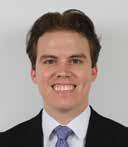
11 ROMAN ECHOES 2022 • VOLUME 27: ISSUE 1
PontificalNorthAmericanCollege pnac_rome Join Us On Facebook & Instagram!
The Beauty of Arriving in Rome
JACOB DERRY '26, DIOCESE OF LANSING
Few would describe the birth of a child as “pretty.” More often, we would call it “beautiful.”
The word “pretty” typically refers to an object’s exterior that is visually pleasing; there is a simple and easy attraction. In contrast, “beautiful” often speaks to the transcendent or deeper meaning underlying an event, object, or person. Beauty, in some way, always reminds us of God.
While at a wedding this past summer, I heard the priest make this distinction between “pretty” and “beautiful.” He noted that many aspects of that particular wedding were pretty: flower bouquets, decorative ribbons, well-groomed hair, and formal attire. Amidst all the pretty things, the priest pointed out that the crucifix is not pretty, but it is beautiful because it is the loving sacrifice that wins our reconciliation and salvation.
In reflecting on the orientation to the NAC, I think of both “pretty” and “beautiful.” Living in Rome, one naturally soaks up many pretty sites and experiences: historic art and architecture, fantastic food, and the vibrancy of the city. Nevertheless, there were plenty of moments from orientation that were less than pretty: the sweltering heat and our subsequent sweat, the humbling attempts to speak broken Italian with natives, and the embarrassment of guessing incorrectly which way to open a door of a given corridor (push or pull?). There was also the discomfort of learning a new culture, a new seminary program, and all sorts of new people. Nothing could prepare me for it all. From this perspective, NAC orientation may appear clumsy, unpolished, and not pretty. But the reality is, just like the crucifix, orientation radiated beauty.
Orientation was beautiful when the faculty and 2nd-year men welcomed us warmly and served us generously in every possible way. It was beautiful when we deepened our devotion to Saints Peter and Paul, whose tombs we visited, and when we prayed the Angelus with the Holy Father. It was beautiful when our class shared our vocation stories with each other and when we hiked up a trail to the Franciscan hermitage in Assisi. These beautiful experiences all spoke passionately of God and helped me recognize the beauty of surrender. For when I surrender myself, my expectations, fears, dreams, and discomforts to God and his Providence—like I tried to throughout NAC orientation—this, too, is beautiful. It’s living like Jesus Christ. n

12 The Pontifical North American College
The New Man Class of 2026 attends Mass in the Catacombs of St. Callixtus during NAC Orientation.
EVENTS CALENDAR
JULY 20
The New Men class of 2026 arrive for Early Orientation. Members of the class of 2025 give them a tour of Rome, including the famed Pantheon

AUGUST 22-24
The New Men travel together to Assisi to pray together and build fraternity

AUGUST 27
Pope Francis elevates His Eminence, Robert Cardinal McElroy, C'86, Bishop of San Diego to the College of Cardinals. Rev. Bradley Easterbrooks '22 and Rev. Guillermo Hernandez '22 celebrate with their diocesan bishop

AUGUST 29
Formation conferences and preaching workshops begin
SEPTEMBER 4
The first of the classes leave for their annual silent retreat
SEPTEMBER 29
Twenty-three deacons from the College are ordained at St. Peter’s Basilica
OCTOBER 3
Very Rev. Mark Lewis, S.J., Rector of the Pontificial Gregorian University, celebrates Holy Mass at the Church of St. Ignatius to inaugrate the academic year
AUGUST 21
Pope Francis greets the New Men following the Angelus at St. Peter’s Square
SEPTEMBER 3
New Men receive a tour of the Papal Gardens at Castel Gandolfo from His Eminence, James Cardinal Harvey '75, Archpriest of the Basilica of St. Paul Outside the Walls

OCTOBER 13
Rev. Msgr. Thomas Powers '97 is installed as the Rector of the College

13 ROMAN ECHOES 2022 • VOLUME 27: ISSUE 1
13 ROMAN ECHOES 2022 • VOLUME 27: ISSUE 1
VOICES OF NAC
Why did you surrender your life to Christ?

After a reversion to the faith in college, I learned that the joy I had been seeking could only be found in the Lord. By surrendering my life to Christ, he not only makes my joy complete, but he invites me to be an instrument of that joy to others. What a gift it is to help others receive the love that Jesus offers!
Brendan Parlett ‘26, Archdiocese of Washington
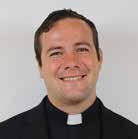

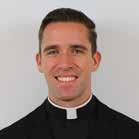
While I worked in my career, I always had a somewhat unsettled feeling. None of my efforts to satisfy my longing ever seemed to fill that hole or ease that restlessness. Finally, after trying to do everything my way and becoming increasingly dissatisfied, I reached out to the Lord and asked him to do what I had been unable to do. He almost instantly answered with a profound sense of peace, in a deeply personal way.
Mitchell Schumann ‘26, Archdiocese of Galveston-Houston
Simply because he asked. As Mary, our mother, tells the servants at the wedding feast of Cana in the Gospel to “do whatever he tells you." In joining seminary and discerning the priesthood, I also seek to follow his will. But not out of blind obedience; rather, out of a love that he has stirred in my heart to pursue him and to be his disciple each day on the journey home to Heaven.
Reed Robinson ‘26, Diocese of Nashville
The call to surrender my life to Christ has always been an invitation by Jesus to love him more. Every time he invites me further into his friendship, I am never disappointed but only end up loving him more. The steps to trust him are usually difficult at first, but I see them as great gifts of the Lord in time as I continue on this adventure with Christ.
Kaleb Mitchell ‘26, Diocese of Helena

Welcoming Our New Brothers
From the moment the New Men arrived at the NAC in mid-August, my understanding of New Man Orientation changed. The moment I had anticipated for so long came much differently than I expected.

Our 2nd-year class began the preparations for the August orientation in March. We solidified the daily schedule, created liturgical plans, devised budgets, and gathered materials for the New Men’s rooms. We planned and prepared nearly all the details before leaving for our summer assignments. Three days before orientation began, we put the finishing touches on the preparations. I quickly discovered, however, that the preparations meant nothing without the ability to respond to the needs of the men in the present moment.
On the first day, three groups arrived from language schools and three waves of new arrivals came from the airport, one of which arrived just moments before the start of the Clap-In and Mass with Msgr. Powers. With so much activity, we had to adapt our former conceptions and plans to meet the needs of the New Men as they presented themselves before us.
Practically every day, we experienced the same challenges. Inevitably, someone would come up to me and say, “We need to change this,” or “We need to fix that.” Even with all the planning, we could not predict exactly how everything would go—having a perfect plan does not compare to the ability to adapt and respond to the need when the circumstances change.
Orientation does not merely comprise a few introductory activities. Orientation welcomes the New Men into the College, but even more, it welcomes these men into our common home. This home brings us closer to Christ through our relationships with each other and our life of prayer and service. In our priestly formation, we desire ways in which we can live out pastoral charity and serve those around us. Often, we look for these opportunities outside of the seminary, but more often than not, the opportunities to love and serve hit closer to home. I now understand orientation as an exercise in pastoral charity; learning to respond to the needs of others, especially our brothers closest to us. n
15 ROMAN ECHOES 2022 • VOLUME 27: ISSUE 1
NICHOLAS STELLPFLUG ’25, DIOCESE OF GREEN BAY
Nicholas Stellpflug ’25 (Green Bay) welcomes new man Charles DeReuil II ’26 (St. Paul and Minneapolis) during his first moments at the North American College.
Small Acts, Great Love
CHRISTIAN CORONA ‘25, DIOCESE OF TYLER
Idid not know what I was getting myself into when I started serving with the Missionaries of Charity. I thought I was there to feed the poor—in the end, they fed me. This August, the College had a showing of the new documentary about the life and mission of Mother Teresa.
The main themes of her life, specifically poverty and surrender, speak powerfully to me as I have been working with the Missionaries of Charity for almost a year as part of my apostolic formation here in Rome. It is inspiring to see these sisters care for the poor and the sick. Day in and day out they spend themselves, giving their time and energy to care for the poor
in seemingly mundane acts of love. Helping the sisters care for the impoverished is an experience that brings one to the utter profundity of the human condition. All transient pleasures and securities pass, suffering comes, and even one’s own health will one day leave. They continually show me that I am completely in the hands of God, though I might be numb to it because I distract myself with my own pleasures. At our deepest level, we are all equally as poor.
Yet, for the sisters, this understanding is not a source of depression or existential angst; this is precisely the source of their hope. The sisters are deeply aware that it was only through the Cross that Christ brought redemp-

tion to the whole human race. They understand their poverty and are confident in Christ’s intimate love and redemption. It is only here that they are truly free. They are free from the cares and worries of the world and focus their eyes on Christ. They surrender themselves fully to his call and allow his will to become their own. It is Christ who calls them to love others in their lowest moments—to enter into poverty and sufferings. In the eyes of the world, they are poor, but with eyes of faith we see they are rich in love. Put simply, Christ calls them to love with his love.
The beauty of the Missionaries of Charity is not in its grandiosity, but in its simplicity. Having surrendered themselves to the will of God for the sake of his love, they do whatever is needed to help the poor. As Mother Teresa said, they perform “small acts with great love.” Some sisters scrub floors, others cook, clean, do laundry, or whatever else is needed. Most importantly, however, they all pray and offer their work as sacrifice to God on behalf of the poor.
Their testimony of Christ’s love has impacted my heart. It is powerful to see them gently care for the helpless, daily supplying for their most basic needs. The sisters have truly given everything, even their own being, to the Lord in order to become his instrument through which He can love. They lead lives of surrender that ultimately lead straight back to God. They are concrete examples of the Lord’s untiring work in the lives of the poor, examples that we can imitate daily. n
16 The Pontifical North American College
Christian Corona '25 (Tyler) makes his way to the Missionaries of Charity's apostolate in Rome's San Gregorio al Cielo. The sisters serve men in need by providing them with food, housing, and care.
Called and Chosen
STEPHEN HOWARD ’25, ARCHDIOCESE OF SYDNEY, AUSTRALIA
The College recently welcomed actor Jonathan Roumie to share a little with us about his life in a Q&A forum. As the man tasked with presenting Jesus through his own face and personality to millions of people through the popular series The Chosen, Roumie’s anecdotes and insights were a consolation to us who are being formed to bear Christ’s face to the world.
The series is well-loved for its very human portrayal of the Gospel characters, but particularly that of Christ. Roumie’s great sense of humor shines in his acting, and he was in good form that evening at the College. We laughed as he told us about his sister seeing his face in prayer and trying to swat it away from her thoughts, and his embarrassment at meeting a man who had tattooed Roumie’s face onto his chest.
One seminarian asked a question referring to the priestly task of acting in persona Christi, and Roumie drew parallels between the priestly life and his own by highlighting four words for us: “please, pray for me.” For Jonathan, humility grants him the ability to see clearly that our lives are always a cooperation with God’s grace, and not simply a combination of chance and human determination, no matter how seemingly spectacular—or small.

Roumie then spoke of an encounter which resonated with many of us. A young woman told him about a time when she had reached rock bottom, had essentially no faith, and nothing to live for. Thanks to a friend’s suggestion, she watched the first episode of The Chosen in which Mary Magda-
lene is saved by Christ speaking her name and claiming her. Through the face and voice of Jonathan Roumie, and the prayers and work of the cast and crew (and behind the scenes, the Lord himself), this young woman experienced the saving power of the God who loves her.
Naturally, when Jonathan heard this, he was overwhelmed with emotion, and stunned by the incredible honor and gift of being that channel for the Lord, and thanked God that even one could be saved through his yes, and through his surrender to Providence. So too were we moved. We recognized that the call of Christ is a gift given through us, so that the lost may see his face. The more that we disappear, the more he may be visible. n
17 ROMAN ECHOES 2022 • VOLUME 27: ISSUE 1
“The Chosen” television series lead actor Jonathan Roumie shares insights with NAC seminarians from his experience of portraying Jesus on the show.
PREPARING TO PREACH
Before preaching his first homily, a seminarian at the College has to pray with, prepare, and deliver 21 practice homilies: 12 in his second year and another 9 in his third year. His peers and formators then evaluate him and assist him in improving his homily. After his ordination to the diaconate, he preaches for the first time to friends and family at his Mass of Thanksgiving. He might then preach regularly at his parish or university apostolate. All of this is meant to prepare him for preaching to the people of God at a parish in his home diocese.
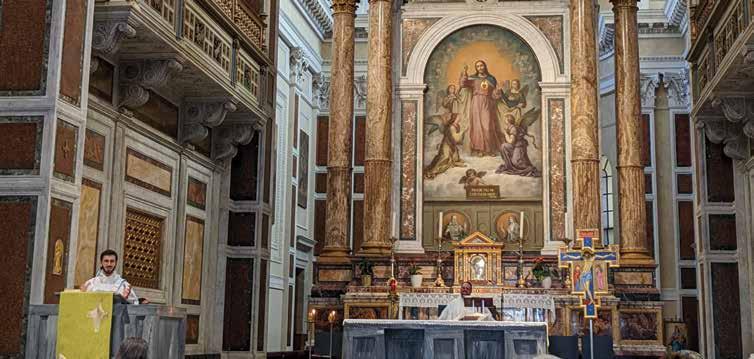
18 The Pontifical North American College MAY 21st Sunday of Ordinary Time Year A 06 MAR 5th Sunday of Lent Year A 18 FEB 4th Sunday of Lent Year A 25 JAN 3rd Sunday of Lent Year A 14 DEC Solemnity of the Immaculate Conception 03 NOV Feast of Our Lady of Guadalupe 24 NOV 4th Sunday in Advent Year A 12 OCT 3rd Sunday in Advent Year A 29 OCT 2nd Sunday in Advent Year A 15 SEP Feast of the Sacred Heart Year A 24 SEP The Epiphany 22 2ND YEAR HOMILY PRACTICA ASSIGNMENTS (2020-2021)
Rev. Mr. Matthew Prosperie '23 (Houma-Thibodaux) preaches his first homily at Sacro Cuore di Gesù al Castro Pretorio.
HOMILETICS AT THE NAC
FR. PETER JOHN CAMERON, OP, CARL J. PETER CHAIR OF HOMILETICS
The aim of the homiletics program at the Pontifical North American College is to train seminarians to preach the Gospel “with unction” (Pope Francis)—preaching that touches people’s lives and brings light to moments of darkness.
“There is no greater priority than this: to enable the people of our time once more to encounter God” (Verbum Domini 2). Preaching is meant to be such an encounter.
To achieve this, student preachers are taught to uphold a key insight of the bishops of the United States in their document Preaching the Mystery of Faith: “Only when the homilist, in a spirit of faith and love, is conscious of his own deepest experience and those of his people can he preach persuasively to them.” This enables the preacher “to develop a broad and profound sensitivity to what really affects other people’s lives,” for the preacher “should never respond to questions that nobody asks” (Evangelii Gaudium 155).
To this end, the seminarians are taught a method of interpreting and actualizing Sacred Scripture by which they preach from and through the Sacred text so as “to penetrate the secret of language” (Verbum Domini 32).
The seminarians are taught that every homily is to offer a concrete proposal offering a Good News answer to some relevant question raised in the hearer’s lives. Every homily is to contain some image or story by which the hearers can verify the benefit of the proposal by comparing it to their own experience. Every homily is also to provide some practical application of the Good News preached—a first step to take. And every homily is to make some reference to the Eucharist.
The student preacher is taught to remember that “the homily possesses a quasi-sacramental character” (Evangelii Gaudium 142) and that “preaching is an act of worship” (Homiletic Directory 4).
19 ROMAN ECHOES 2022 • VOLUME 27: ISSUE 1 3RD YEAR HOMILY PRACTICA ASSIGNMENTS (2021-2022) MAY 34th Sunday of Ordinary Time – Feast of Christ the King Year A 20 MAY 17th Sunday of Ordinary Time Year A 12 APR 16th Sunday of Ordinary Time Year A 07 MAR 15th Sunday of Ordinary Time Year A 17 FEB Easter Vigil with Baptisms and Confirmations 24 DEC Christmas Family Mass with Children & Carols 02 OCT Thanksgiving Day 21 OCT 2nd Sunday in Advent Year A 07 SEP Mass of Christian Burial 09 SEP Marriage within Mass 08
Diaconate Ordination Week
EXCERPT FROM MSGR. POWERS’S HOMILY AT THE SUNDAY FAMILY MASS
On Thursday, these men who will be ordained, will seem to be, in the eyes of the world, made less free, if not enslaved, by their promises of celibacy, prayer, and obedience. But the world does not understand true freedom. These men are, indeed, free. And the angels, especially the Archangels Michael, Gabriel and Raphael, whose Feast we celebrate on Thursday, will assist them and share in their freedom. And so, if I may, a word about deacons, angels and freedom.
Deacons and angels have always had a special relationship in God’s plan. Throughout the history of Christian art, angels are often depicted wearing dalmatics because just as deacons assist at the altar, angels assist at the heavenly banquet. After the temptation in the desert angels came and ministered to Jesus, and the Greek verb used in Scripture is diakonoun, meaning angels “deaconed” to Jesus. And Scripture also tells us that, despite persecution, the face of St. Stephen, the deacon and first martyr, “was like the face of an angel.”
But maybe the most important reason these men will stay close to the holy angels is this: when angels make a decision, it is once and forever, never to be changed, and in that decision, the angels are completely free. And so they will help these new deacons persevere in the promises they will make on the day of their ordination—promises that will make them free.
All of us here will witness something extraordinary in four short days. We will watch and pray as these 23 men lie prostrate in St. Peter’s Basilica, giving their entire lives in service to Jesus and his Church. And as we watch and pray, we will also rejoice, for we will know that they are free men: free to love and serve others; free to pray and intercede for the people of God; and free to minister within the ordered, hierarchical structure of the Church. And, after asking the prayers of the Mother of God, the first ones to whom we will turn and ask for intercession in the Litany of the Saints will be the holy angels, of whom Mary is Queen.
Fr. Brendan Hurley SJ, Coordinator of Spiritual Formation, leads a prayer vigil for the soon-to-be deacons the night before their ordination in St. Peter's Basilica.

2022 CLASS OF DEACONS
Ordained in the Papal Basilica

of St. Peter
Rev. Mr. Samuel Anderson
Rev. Mr. Jared Clements
Rev. Mr. Taylor Colwell
Rev. Mr. Brent Durschmidt
Rev. Mr. Justin Echevarria
Rev. Mr. Ryan Glaser
Rev. Mr. John Lado
Rev. Mr. Zane Langenbrunner
Rev. Mr. Joseph Lapeyrouse
Rev. Mr. Nicholas Le Rev. Mr. Jose Lim
Rev. Mr. Elder Maldonado Zavala
Rev. Mr. Isaac Pecha Rev. Mr. Ben Pribbenow Rev. Mr. Matthew Prosperie Rev. Mr. Patrick Ryan Rev. Mr. Daniel Scanlan Rev. Mr. Matthew Schilmoeller Rev. Mr. Daniel Sessions Rev. Mr. Richard Sofatzis
Rev. Mr. Kelby Tingle Rev. Mr. Krzysztof Tyszko Rev. Mr. Steven Vetter
Ordained in their Respective Dioceses
Rev. Mr. John Bilenki Rev. Mr. Timothy Courtney Rev. Mr. Alex Fry Rev. Mr. Joshua Hill Rev. Mr. Augustine Mang Rev. Mr. Oscar Marquina Romero Rev. Mr. Michael Nugent Rev. Mr. Raymond Pendleton
21 ROMAN ECHOES 2022 • VOLUME 27: ISSUE 1
First Homilies
New Deacons Preach at Masses of Thanksgiving

The Christian message [is] not only “informative” but “performative”.
That means: the Gospel is not merely a communication of things that can be known—it is one that makes things happen and is life-changing.
Spe Salvi 2
22 The Pontifical North American College
Daniel Scanlan ’23 Diocese of Venice in Florida
CHURCH OF ST. LOUIS OF THE FRENCH
"If you look at Caravaggio’s painting (the Call of St. Matthew), it is Jesus who calls Matthew. In the Gospels, it is Jesus who calls Peter and Andrew, and all the other apostles. God’s call is always an invitation and it is such a beautiful gift because it is God who wants to be in relationship with us. This call to conversion is his initiative, his desire for us to be with him."
Justin Echevarria ’23 Diocese of Portland in Oregon SANT’ANDREA DELLA VALLE




Taylor Colwell ’23 Archdiocese of Washington
BASILICA OF SAINT MARY MAJOR
"A vocation of service to God and the Christian people is always the result of God’s call—the result of God revealing himself in a personal way. God revealed himself to me in a way that was truly life-changing and led me to give myself over to his plan."
"Biblical texts are not archaic, but dynamic! The Bible is the story of salvation, the story of our salvation. The end of the Bible in the Book of Revelation does not say “The End,” but rather “The grace of the Lord Jesus be with all.”
Richard Sofatzis ’23 Archdiocese of Sydney
DOMUS AUSTRALIA
"We can find alongside the Archangels, St Jerome, and the beautiful choir singing the music, that we can be part of God’s plan along this everlasting way of guiding each one of our brothers and sisters to eternal life."
23 ROMAN ECHOES 2022 • VOLUME 27: ISSUE 1
Interview with Our New Music Director Stephen Smith
WILL ROBBINS ‘25, DIOCESE OF BEAUMONT
Welcome to the North American College! What are you each most looking forward to in joining the College?
Stephen: First and foremost, I look forward to helping in the musical formation of these men. These seminarians are the next generation of priests, so it is a great responsibility to ensure they are exposed to the Church’s great wealth of music. In my time as a church musician, I have seen firsthand the difference a strong musical formation makes.
Elizabeth: In addition to getting to see the men grow in their faith, this is a great opportunity for us to deepen our faith.
Being so close to the heart of the Church is an incredible blessing, and we are so fortunate to have it as the backdrop of our time here.
What went into your decision to apply for this position, especially since it required moving across the world?
A position like this is a once in a lifetime opportunity. When discerning to accept the position, we were in contact with Mr. Nicholas Will, the Director of Liturgical Music from 2018 to 2020. He also had relocated across the world with a young family and was incredibly helpful in sharing

24 The Pontifical North American College
Mr. Stephen Smith with his wife, Elizabeth, and their daughter, Briella, in the choir loft of the Immaculate Conception Chapel.
his experiences at the NAC while raising a family. I was also excited about the challenges this would bring, both for our family and my own musical growth. Elizabeth was also incredibly supportive and encouraging in my decision to accept.

Stephen, your brother, Fr. Philip Smith, is a graduate of the NAC. Did you ever visit the College when he was a seminarian? If so, what is it like coming back?
I visited the College with my parents and two of my brothers in the spring of 2009. While there were many highlights from the trip, two memories stick out to me. First, Msgr. Powers, then my brother’s spiritual director, celebrated an early morning Mass with our family in the crypt of St. Peter’s Basilica. Afterward, we had the Basilica nearly to ourselves; it was an unforgettable memory! The second was the tour my brother gave us of the NAC, which ended with a stunning rooftop view of Rome.
Coming back as a member of the staff is a humbling but exciting endeavor. The NAC holds a rich history in so many ways. It is the honor of a lifetime to have an active role in the musical formation of these seminarians in the heart of the Church.
You moved here with your wife, Elizabeth, and ten-month-old daughter, Briella. Can you tell us about what that was like? Did it change anything in your relationship with God?
Once I accepted the job, we had just about a month to get everything squared away. It was a challenge deciding what to sell, store, give away, and discard. Reducing everything we own to a few suitcases and boxes was a lofty task. Thankfully, we had the help of friends and family.
Overall it has been a pretty seamless transition. The NAC has been great to us! Dr. Mark Glafke, the Coordinator of Counseling Services, and his wife, Michaela, have been a great help in teaching us the lay of the land, especially when it comes to learning where to shop for groceries and where to find the best gelato.
This experience has taught us to have a total trust in the will of God. During the six months prior to accepting the job, we dealt with many frustrating roadblocks while trying to buy a house and settle in the Columbus area. Now, it is abundant-
ly clear why so many of those things were falling through. Three months ago, I could have never predicted we would be living in Rome and making music with these wonderful people. It was a reminder for me, that as much as I want to be in control of my life, God’s will and plans for my family and me are much greater than I could ever imagine.
How has your first month in Rome been? Have you found a favorite pasta yet?
Stephen: The first month was a bit like drinking out of a fire hose. Moving here three weeks before the Diaconate Ordination forced me to acclimate quickly to the music program. However, working with so many talented and hard working young men has been one of the most rewarding experiences of my life.
Every pasta I have tried has been outstanding with carbonara and cacio e pepe very high on the list.
Elizabeth: Crazy. Busy. Insane. Wonderful. Amazing. There are still these little moments of “Oh wow, we live in Rome!” and it is honestly bizarre to me. Thankfully, Briella is a super easy baby, and that has definitely eased the transition.
While I have not had a pasta here yet that I do not like, I am typically pretty non-discriminatory when it comes to pasta. The NAC’s lasagna is high on the list, but to be fair to all pastas, I cannot name one single favorite. n
25 ROMAN ECHOES 2022 • VOLUME 27: ISSUE 1
Briella tries her hand playing the College's three-manual organ as her father and mother look on.
Opening Mass Homily
REV. MSGR. THOMAS POWERS ‘97, DIOCESE OF BRIDGEPORT
One hour after sunrise on October 7, 1571, a winner-take-all battle for the Mediterranean Sea and, ultimately, Christian Europe was about to begin. More than 200 Christian ships holding 30,000 troops above deck and at least that many rowing below, faced off against an opponent with 250 galleys carrying 75,000 men.
And the immediate preparation for the Battle of Lepanto began. On the Ottoman side, thousands of men screamed from the depths of their lungs, pounded their chests, blew horns, clashed gongs and cymbals, and fired muskets, a frightening demonstration of power amidst a cacophony of noise. The Turks had no doubt they could fight and win relying on their own strength, perseverance, and will-power.
The Christians, however, did something quite different and quite remarkable. With rosaries in their pockets and crucifixes held aloft by priests on every boat, they knelt down in silence, surrendering themselves to the Lord. They knew that, although they would fight with all their strength, they had to rely on divine help; because they could not win on their strength, perseverance, and will-power alone.
Brothers, you and I experience a similar battle within our own hearts every day. We often want to take matters into our own hands, relying on our own strength, perseverance, and will-power.
We want to be perfect in the eyes of others and don’t want to be vulnerable or appear weak. And that is what the Evil One wants us to believe, and that is what the Evil One will tempt us to believe. And that is why we reject it. I told the new deacons
the evening before their ordination to pay attention to what the Church in her liturgy asks a man to do as a final act of preparation just before the prayer of ordination and the imposition of hands. She does not ask him to shout with self-confidence, to pound his chest or to rely on his own strength, perseverance, and will-power alone. She asks him to lie prostrate in silence, surrendering himself completely to Our Lord. It is not a passive gesture; it is an active one by which one, not unlike the Christians at Lepanto, chooses to “rely on the help of God.”
St. Thérèse summed this up when she wrote: “Sanctity does not consist in performing such and such acts; it means being ready at heart to become small and humble in the arms of God, acknowledging our own weaknesses and trusting in His fatherly goodness to the point of audacity.”
When the sun rises every day here at this North American College, this is our battle. It is a battle that never divides us, because it is a battle that we share together as brothers, helping each other to grow in trust of the Lord and building a strong foundation for this house. It is a battle that will not be decided in one day, and it is a battle we win by surrendering, not to the enemy or to passivity, but to Jesus, through Mary, Our Lady of the Rosary. For it is by his strength and grace we will prevail. n
26 The Pontifical North American College
Our Lady Of The Rosary
Take up your weapons! We must go to war! To rescue Famagusta from the Turks. I’ll fight! I’ll die! I’ll save that Cyprus shore! And battle Ali Pasha where’er he lurks.
Me, too! I’ll fight to serve the Holy League. But lacking musket, sword, and galleass, Five hundred miles from that Ionian Sea, What can I do to help secure success?
O Blessed Pius! Still your words ring true: In times of war and heresy and strife We raise our eyes, and weeping hope anew, Implore the Blessed Virgin: Grant us life. So march we on with weapons close at hand; The rosary gives strength to any land.

27 ROMAN ECHOES 2022 • VOLUME 27: ISSUE 1
Kyle Lang '26, Diocese of La Crosse
Ad hoc annum et ad multos annos
 The Pontifical North American College
The Pontifical North American College
A Toast to the Year Ahead
REV. MR.
COURTNEY ’23, DIOCESE OF ARLINGTON
Each semester at the United States Military Academy, the Corps of Cadets carries out a competition called “Soldier of the Quarter.” The cadets who are nominated to vie for the title of SOQ are evaluated in each aspect of academy life: academic and athletic performance, military discipline, function in the command structure, shoe-shining, and all the rest. They also undergo the SOQ boards, a panel interview regarding each cadet’s philosophy towards Army leadership.
During my time at the Academy, I never secured a nomination to compete for Soldier of the Quarter, so the story from the SOQ board I share this evening comes to me secondhand. The question posed to the hopeful cadets in the fall of 2012 was this: which is more important: the men or the mission?
One cadet said, “The men, because the mission will take care of itself.” This was not the answer the cadre were looking for, as a foot patrol or pursuit of a high-value target or room clearing will not take care of itself. One of my company mates answered, “the mission.” And he offered another insight: “but here at West Point, the men are the mission.” This cadet must have distinguished himself with that response because, if my memory serves, he did go on to win the coveted SOQ title.
At the North American College, we are in this same unique position. The men are the mission. Any conflict between the two is only apparent. Because of this fact, we can come together at the beginning of a new school year to celebrate a renewal.
It’s the men, the faculty and seminarians of the NAC, who have been renewed. Men are renewed by summer pastoral work, vacations, and the Holy Spirit.
Besides the individual men of the house, our composition as a community has also been renewed. Never before has the combination of individuals in this room tonight, each with our own experiences, talents, expectations, and personalities, been assembled in one place. And it never will be again.
In this way, the very mission of the NAC is new and unique this year. It has never been done quite the same before. Our common task is to carry out the work of formation, not abstractly, but with these men, by these men, and through these men.
Of course, to suggest that the mission of the College is completely new would be a step too far.
We stand upon a hundred and fifty years of NAC tradition. We respond to three hundred years of hope and expectation of the faithful in America. We are rooted in the two-thousand-year history of the Church.
The mission of the NAC remains the same because of the presence among us of a man who needs no renewal but is the source of our renewal. A man who needs no formation but is he to whom we conform ourselves. Let us stand and raise a glass to the mission of the Pontifical North American College. Ad hoc annum et ad multos annos. n
29 ROMAN ECHOES 2022 • VOLUME 27: ISSUE 1
Our common task is to carry out the work of formation, not abstractly, but with these men, by these men, through these men.
TIM
Our Rectors
Dom Bernard Smith OSB 1859–1860
Fr. William G. McCloskey 1860–1868
Fr. Francis S. M. Chatard 1868–1878 Msgr. Louis Hostelot 1878–1884
Fr. Augustine J. Schulte 1884–1885
Fr. Denis J. O'Connell 1885–1895
Fr. William H. O'Connell 1895–1901
Bishop Thomas F. Kennedy 1901–1917
Msgr. Charles O'Hern 1917–1925 Msgr. Eugene S. Burke 1925–1935
Bishop Ralph L. Hayes 1935–1944
Fr. James Gerald Kealy 1945–1946
Bishop Martin J. O'Connor 1946–1964
Bishop Francis F. Reh 1964–1968
Bishop James A. Hickey 1969–1974
Msgr. Harold P. Darcy 1974–1979 Msgr. Charles M. Murphy 1979–1984 Msgr. Lawrence M. Purcell 1984–1990
Msgr. Edwin F. O'Brien 1990–1994 Msgr. Timothy M. Dolan 1994–2001 Msgr. Kevin C. McCoy 2001–2005
Msgr. James F. Checchio 2005–2016
Fr. Peter C. Harman 2016-2022 Msgr. Thomas W. Powers 2022-

'51 meets with
St.
30 The
opposite page top to bottom Then-Monsignor, Timothy Cardinal Dolan '76 leads a group of seminarians in St. Peter's Square.; Then-Bishop, James Cardinal Hickey
Pope
Paul VI.; Former rectors of the College attend an alumni reunion: Msgr. Harold Darcy ’55, Very Rev. Timothy Dolan ’76, James Cardinal Hickey ’51, then-Msgr. Edwin Cardinal O’Brien’76, and Msgr. Lawrence Purcell ’66.; Msgr. Thomas Powers is installed as the 24th Rector of the College at Holy Mass celebrated by Bishop Robert Deeley (Portland), Chairman of the Board of Governors. Also pictured: George Cardinal Pell, Prefect-emeritus of the Secretariat for the Economy; Lazarus Cardinal You Heung-sik, Prefect of the Congregation for the Clergy; Archbishop Allen Vigneron ‘75 (Detroit); Bishop Frank Caggiano (Bridgeport), Msgr. Powers’s ordinary; and Rev. Gregory Polan O.S.B., Abbot Primate of the Order of St. Benedict.
Pontifical North American College





31 ROMAN ECHOES 2022 • VOLUME 27: ISSUE 1

32
The Pontifical North American College
Rev. Mr. Ben Pribbenow ’23 (Green Bay) rejoices with his family at the foot of the sanctuary in St. Peter’s Basilica after his ordination.
From Disinterest to Diaconate: A Vocation Story
REV. MR. BEN PRIBBENOW '23, DIOCESE OF GREEN BAY

For most of my life, I had no interest in becoming a priest. If you are looking for a story of a seminarian who spent his childhood "playing Mass," you can look elsewhere. I preferred to spend my time jumping my bike off ramps, building forts in the woods by my house, and playing sports.
Despite my taste for extreme sports, as a child I looked like someone who might one day become a priest. My family and I were Sunday Mass goers, and I went to the parochial school. Beyond just attending Mass, I sang in the youth choir that my Dad co-led. Throughout middle and high school, I served as an altar server and read at Mass. There were a few nudges toward the priesthood by parishioners, but I was not convinced.
Things began to get interesting when I left home and went to the University of Wisconsin - Madison for college. I was inspired by the role faith played in my siblings' lives when they attended the same university. As a result, I got involved at St. Paul University Catholic Center as soon as I arrived in Madison. Quickly, I made Catholic friends, joined a bible study, started praying, and started attending daily Mass.
My desire for holiness did not transfer to a desire for the priesthood. I was more attracted to married life, a life for which I had many witnesses. I was also afraid of what life might look like as a priest. I was afraid that I would be lonely or that people would not like me. It did not seem like the life for me.
Then, in a non-descript retreat center in south central Wisconsin, everything changed. Following the retreat director's meditation on "Vocation," I wrote in my journal, "Just finished [the vocation] meditation … I think I'm being called to priesthood." I experienced God's peace and love in a way that I never had before. Just like that, I went from being totally opposed to becoming a priest, to desiring the priest-
hood. While I tried to forget about this experience upon returning to campus, the Lord was persistent.
Our chaplain helped me recognize my freedom before God. God was not going to force me into the seminary. He also made me realize that I could find joy and fulfillment in life as a priest. This gave me further peace which persisted throughout the remainder of that year in college. By the end of that year, I knew that I needed to go to the seminary, to at least give this vocation a chance.
As the years have continued, my desire to become a priest has only grown. Seven years after my experience on retreat, I am a Deacon of the Church destined for the priesthood. So, a lot has changed from my days as a child. Amidst the change, God's love has remained a steady constant. To him be glory and praise for ever and ever, amen. n
33 ROMAN ECHOES 2022 • VOLUME 27: ISSUE 1
During his childhood, Rev. Mr. Ben Pribbenow ’23 (Green Bay) had greater interest in extreme sports than the priesthood.
1st Sunday of Advent

Jesus exhorts us to remain vigilant for his coming during Advent. This season marks a time to prepare for both his coming at Christmas and his Second Coming at the end of time. To help us prepare our hearts during this season, he also comes to us daily in the Eucharist. How can I be aware of the love of Christ that comes to me during this season?
Rev. Mr. Matthew Schilmoeller ‘23 Diocese of Lincoln
Advent Reflections
2nd Sunday of Advent
John the Baptist lived his life in surrender and humble witness to Jesus. From the moment he leapt in Elizabeth’s womb, John was proclaiming the greatness of the Christ who was to come. In his ministry, John baptized others into repentance, but he proclaims that the baptism of Christ is infinitely more important and valuable. As he says in the Gospel of John, “He must increase, I must decrease.”
How can we echo the same disposition of humility to Jesus?
Rev. Mr. Matthew Schilmoeller ‘23 Diocese of Lincoln
Immaculate Conception

Sin entered humanity through Adam and Eve and although we are not culpable for the action itself, we still experience the consequences of that action which we call original sin. Mary was preserved from original sin—why? Because as the true Mother of God who carried Christ in her womb, sin couldn’t have power over her as sin never had power over Christ our Lord.
Rev. Mr. Oscar Marquina Romero ‘23 Diocese of Salt Lake City
34 The
Pontifical North American College
Newly ordained deacons reflect on the Gospels Solemnity of the Immaculate Conception
Reflections
for the four Sundays of Advent as well as for the and the Feast of Our Lady of Guadalupe
Our Lady of Guadalupe

4th Sunday of Advent

Discerning the will of God involves an interaction between human meditation and divine inspiration. As Joseph was pondering how to respond to the discovery of Mary’s pregnancy (meditation), the angel bursts onto the scene to communicate God’s revelation (inspiration). When has God “interrupted” my human musings with his divine revelation? When has he led me down a different road than the one I originally had in mind?
Wherever Mary appears, she inspires joy: Gabriel’s joyful greeting (Lk 1:28), Elizabeth’s sense of wonder (Lk 1:41-45), and Juan Diego’s trusting response to Mary’s comforting words, “Am I not here who am your Mother?” How does Mary want to inspire joy within my life today? How am I being called to inspire joy in others, as she does?
Rev. Mr. Zane Langenbrunner ‘23 Diocese of Fort Wayne-South Bend
Rev. Mr. Zane Langenbrunner ‘23 Diocese of Fort Wayne-South Bend 3rd Sunday of Advent Life can be filled with burdens and discontentment—we could be left asking the same question John the Baptist asked: “Are you the one who is to come, or should we look for another?” Christ doesn’t respond with words, but rather with actions: “the blind regain their sight, the lame walk, lepers are cleansed, the deaf hear…” Our hope and our joy are not born out of well-structured discourses. On the contrary, hope and joy are born out of real experiences of love and grace.
Rev. Mr. Oscar Marquina Romero ‘23 Diocese of Salt Lake City
35 ROMAN ECHOES 2022 • VOLUME 27: ISSUE 1
Living in the Casa Tension
REV. JONATHON MEYER ‘24, ARCHDIOCESE OF LOS ANGELES
not always easy, but to partake in the life of the Casa means to open oneself to both challenges and affirmations; challenged in our theological perspectives and personalities, but affirmed in a solidarity that we are not struggling alone in this mission.
As I begin my fourth year at the Casa Santa Maria, a question keeps nagging my mind: “Am I losing touch with reality?” I admit, from all outward appearances, life here is undeservedly blessed: from the predictability of life with its few disruptions to the semi-luxurious accommodations in the heart of the Eternal City. Meanwhile, many of our brother priests back home struggle to “catch a breather” from complex pastoral situations, plans for evangelization, the demands of maintaining a parish (and maybe a school) – all in the face of a thinning presbyterate – while we benefit from the convenience of fraternal camaraderie. The Casa could be viewed by some as an ivory tower or an oasis, a place protected from the pressures of the world and so also the
demands of Christ; but that has not been my experience.
While Academia might keep us at a cruising mental altitude of 35,000 feet, the 57 priests who live at the Casa this year, and who represent all parts of the U.S. and Australia, serve as effective barometers to keep each other grounded. What I mean is that our reality, although not filled with the same pressures of most diocesan priests, is nevertheless measured by the constant invitation to conform our lives to Jesus. For example, when I walk out of my room I encounter another priest, one who is a brother but still an individual quite unlike myself. Or, I open a book and encounter another mind, one who still seeks the Truth, and yet, perhaps, in a way foreign to my own. These encounters are

The holiness of life, intelligence, and gifts I have witnessed in my brothers both impress and convince me to bring to fulfillment the good work God has begun in me. And when jealousy or insecurity set in, the Lord uses these same men to build me up and keep me accountable to the mission I have been given. Iron sharpens iron, and some of the efforts where I have experienced that most at the Casa include our daily holy hour, within various priest support groups, at a dogmatic reading group, through a Thomistic discussion group, at monthly colloquia for future seminary formators and canon lawyers, and especially through the communal celebration of Holy Mass. Even the occasional puzzle and pinochle game have their place. If anything, the fruit of growing in our vocation here is only impeded by isolating oneself.
While the reality at the Casa Santa Maria is, no doubt, different from home, and we look forward to returning, this time is far from being a break from the challenges of living out Christ’s priesthood. While we pray for our brother priests on the front lines I ask your prayers for us, that this time of ongoing formation does not blind us to reality, but rather sharpens our sight so we face it with fresh eyes, and always with the help of God. n
36 The Pontifical North American College
The 2022-2023 residents of the Casa Santa Maria come from various dioceses across the United States and Australia.
Institute for Continuing Theological Education Update
REV. EDWARD LINTON, OSB, DIRECTOR OF ICTE
On August 16, 1810, while avoiding stormy weather in the Mediterranean and at port in Cagliari (Sardinia), the American Merchant Ship Hercules surrendered to the HMS Pomone. The HMS Pomone was a British frigate of 38 canons which had already distinguished itself in the Napoleonic Wars then raging in Europe. However, almost by accident, it was about to obtain its most prized trophy when the freight of the Hercules was brought on board the HMS Pomone.
Among the seven children on board the Hercules and bound for the USA was Lucian’s oldest daughter, 15-year-old Charlotte Bonaparte, whom the family called “Lolotte.” Following her Uncle Napoleon’s defeat, Charlotte returned to Rome and married Prince Mario Gabrielli. The princely seat of his family and where the couple lived, was the Villa Gabrielli, which we now call “The Casa O’Toole.” Though Charlotte Bonaparte never made it to the USA because of the surrender of the Hercules, one can say that the USA came to her!
As the Princess Gabrielli, Charlotte Bonaparte was known in elite social circles for her intellect and stimulating conversation. An avid collector of books, she possessed an active and curious mind. In an age before radio, television, and internet, she invited interesting people to speak to friends at her Palazzo, which is now home to the Institute for Continuing Theological Education (ICTE). Indeed, the Casa O’Toole continues her grand tradition of expanding minds by inviting interesting people to speak to priests who have come to Rome for continuing education!
Eight days earlier, the Hercules left Civitavecchia (Italy) bound for Philadelphia. On board was Lucian Bonaparte, his wife Alexandrine, their seven children, and a retinue of over 25 servants. Lucian had a contentious relationship with his older brother, Napoleon, and decided to flee with his family to the United States of America. King George III, having received news of the human cargo recently brought on to the HMS Pomone, was not about to let that happen. He understood their usefulness in making propaganda against Napoleon Bonaparte with whom he was involved in a bitter struggle. Therefore, Lucian Bonaparte, his family, and their retinue were transferred to England where they were greeted warmly by a public that felt they shared a common foe.
Space is still available for our Spring 2023 Program which runs from January 9 to April 3. Presentations offer an opportunity for priests to refresh and deepen their understanding of Scripture, Medical Ethics, Preaching, and much more. An optional pilgrimage to the Holy Land is scheduled for February 23-March 3 (for an additional fee). All participants will participate in a retreat in Assisi from March 19 to March 24.
We are now accepting applications for our Autumn 2023 programs. The theme of these programs is Marian Theology. Module 1 (September 4-29), Module 2 (October 3-21), and Module 3 (October 23-November 18) may be taken together or separately. If you can’t be free for all three modules, why not consider making a mini-sabbatical by enrolling in only one or two of the modules?
For more information about our Sabbatical and Continuing Education programs, please write romeshabat@pnac.org. n

37 ROMAN ECHOES 2022 • VOLUME 27: ISSUE 1
Rev. Edward Linton, O.S.B., Director of ICTE, stands in front of the Casa O’Toole, which was once the home of Charlotte Bonaparte and now serves as the residence for ICTE participants.
Remembering Those Who Came Before Us
MARK RANDALL, CFRE • EXECUTIVE DIRECTOR, INSTITUTIONAL ADVANCEMENT

The month of November is a time when Catholics remember those who have died. The College community begins this month with a special Mass at our mausoleum where we remember in prayer all the deceased faculty, students, and benefactors of the College.
Throughout the month, those same souls, plus your own loved ones, will be remembered at every Mass celebrated at the College. You may have already sent in your intentions, and you can be assured that the community will lift them up in prayer.
visit to the mausoleum), we found it. It was a blessing to show them his final resting place.
A more recent experience with a dear friend of the College illustrated just how precious is our time here on earth. Mr. Den Jilot and his wife Lynne established the Cardinal James Harvey Household Fund in 2019. Their generous gift enabled the renovation of the Seminary kitchen last summer and will also provide many future enhancements to the College that directly benefit our community. (The College honored Den and Lynne at the Rector’s Dinner in April – an honor they waited two years for, given the challenges of COVID!)
‘58
This past July, I celebrated my tenth-year anniversary of working for the College. It’s hard to believe that much time has passed, and more so, the vast number of lay and alumni benefactors I have encountered. It has truly been an honor to meet so many people who have sacrificially given their resources to support the noble work that we do in Rome every day.
These days I am remembering some of our deceased alumni who, not only during their lives, but in their final wishes were so generous to the College. Msgr. Val Peter ’60, C’66, a priest of the Diocese of Omaha and the former director of Boys Town, was incredibly generous to us. For many years, he gave a very significant sum to help underwrite the tuition for students across the United States whose bishops otherwise would be financially unable to send them to Rome. His legacy will enable us to help these future seminarians on their vocation journey.
I also remember Msgr. Roger Roensch ‘58 – truly, one of the greatest “PNAC Ambassadors” of all time. During his years as the Director of the Bishops’ Office for U.S. Visitors to the Vatican, which we sponsor, countless pilgrims came to know the College. A few years ago, close friends of Monsignor visiting Rome asked me to take them to Monsignor’s tomb at the PNAC mausoleum at Campo Verano – Rome’s biggest cemetery. We set out in a taxi, and after a very complex journey amidst the thousands of graves (it was my first
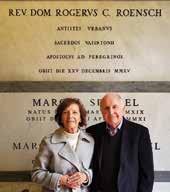
Den died very unexpectedly this past July. I had just been with him the month before at his home in California. At that lunch, he reiterated his dear love for the College and his belief that the formation experience in Rome was so valuable for the Catholic Church in America.
Hundreds attended his funeral which was a beautiful celebration of his life, his generosity, and his commitment to the faith. He is dearly missed by his family and those of us who were privileged to know him.

Space here does not permit me to fully remember so many other benefactors whom I have met, who are no longer with us. When we lose a loved one, we naturally feel a sense of wanting to make sure their legacy is remembered and valued for generations to come. For the generous souls who have supported the College in their life and death, at least some part of their legacy is knowing that their investment in the Pontifical North American College will benefit countless men who come to Rome to be formed as priests for Jesus Christ in the heart of His Church. May they rest in peace. n
‘99 (Springfield in Illinois).
38 The Pontifical North American College
With Den and Lynne Jilot, and former rector, Rev. Peter Harman
Nick and Emma at the tomb of Msgr. Roger Roensch


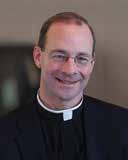
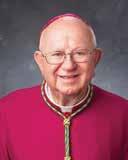
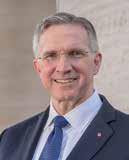

For more information about The Pontifical North American College, subscription questions, or to learn about ways you can financially support “America’s Seminary in Rome,” please contact Mark Randall, CFRE, Executive Director, Institutional Advancement. Tel: (202) 541-5411 I Fax: (202) 470-6211 I Email: pnacdc@pnac.org I Website: www.pnac.org The latest news and photos from Rome. Over 15,000 followers, fans, and friends – join us! facebook.com/PontificalNorthAmericanCollege instagram.com/pnac_rome Save the Date! THE 29TH ANNUAL RECTOR’S DINNER APRIL 20, 2023 Join us for a Roman evening celebrating the noble work of the Pontifical North American College and those who support our mission. Announcing our 2023 Rector’s Award Honorees Most Rev. William Murphy ’65, C’74 Bishop Emeritus of Rockville Centre Mr. Patrick Kelly Supreme Knight of the Knights of Columbus Invitations, sponsorships, and registration available February 1, 2023. www.pnac.org/rectorsdinner Hosted by our new rector, Monsignor Thomas Powers ’97 Most Rev. William Murphy ’65, C’74 Mr. Patrick Kelly Monsignor Thomas Powers ’97 39 ROMAN ECHOES 2022 • VOLUME 27: ISSUE 1

NON-PROFIT ORG. US. POSTAGE PAID PERMIT NO. 144 WALDORF, MD The
North
College Office of Institutional Advancement 3211 Fourth Street, NE Washington, D.C. 20017-1194 ADDRESS SERVICE REQUESTED1
Pontifical
American







 4 The Pontifical North American College
4 The Pontifical North American College





































 The Pontifical North American College
The Pontifical North American College























